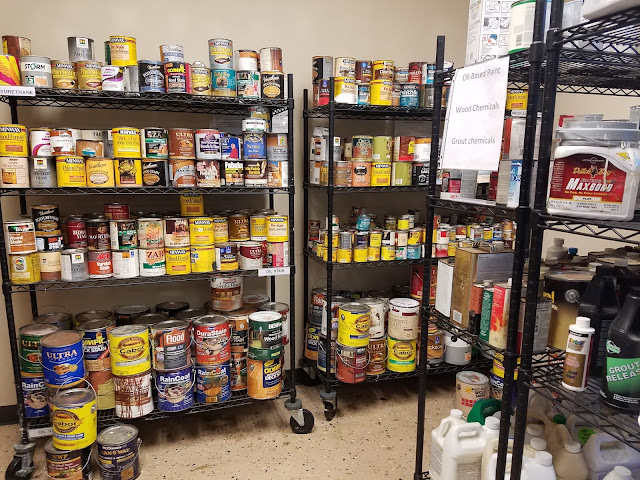Environmental Studies Field Trip Series
by Jenni Abere
This week, we went to two different sites that are part of Ramsey County's waste diversion efforts. First, their household hazardous waste drop-off site, then the Midway yard waste and organics drop-off site on Pierce Butler.
Household Hazardous Waste
Household hazardous waste refers to anything that might be particularly harmful in a landfill, such as toxic and flammable items. Some examples are batteries (vehicle, rechargeable, and button), oil and gasoline, paint, cell phones, and cleaners. Liquids are also undesirable in landfills, even if not "hazardous."
Most of these items are not illegal to throw away, so the drop-off program is on a voluntary basis. It has good participation, however. Last year, there were 29,000 visits to the drop-off center, and this number has been increasing every year.
637 tons of waste were collected last year. 57% of this was recycled. 35% was reused, in the free reuse center. 7.2% was incinerated at the Alexandria site, and 0.8% was landfilled. This drop-off site is run by a private contractor, Bay West. This company started in Duluth, and now does work nationally with the military, emergencies, and superfund sites.
Private contractors such as Veolia Environmental Services are involved in the recycling of the materials once they have been collected.
The free reuse center, at the same location as the drop-off site, is a great place; a lot of half-full cans of paint come in, and instead of being wasted, other people can take whatever they have a use for. 66,000 pounds of materials flowed through this center last year.
It's not just paint: The shelves are also stocked with cleaning products, fertilizers, and other chemicals. Reuse centers like this exist in many counties, and some are much larger than Ramsey County's. Before you go to Home Depot, shop here!
Yard Waste and Organics
Next, we visited the yard waste and organics drop-off site on Pierce Butler. The fall is a busy season for yard waste, which has now been banned from landfills due to capacity and leachate concerns. This is a drop off site only: the material is composted elsewhere. 10% of the what's collected is composted at a county-owned site, and then this compost is given away for free in the spring. The majority of material (there is way too much for the county to handle) is taken by private composting companies.
 |
| This large mulch pile represents one day of collection. Not pictured: the even larger brush pile. |
Some of the brush is ground up and taken by District Energy, a non-profit utility that provides heating for downtown St. Paul mostly through burning wood waste.
This site also has 3 4-cubic yard dumpsters for organics collection. Drop off sites like this are a bridge to curbside composting, which we may see in St. Paul as soon as 2018. The program expanded rapidly for a while, but now has leveled out at about two thousand homes participating.
 |
| These three dumpsters fill up in a week. |
 |
| Free bags! |
The city was concerned about odors and pests and about people putting their trash in the dumpsters. There have not been problems with odors or pests, thanks in part to the program providing free compostable bags to participants (free compostable bags!). They haven't seen many issues with contamination either; the education has been effective and the people participating have been responsible.
These concerns are very familiar to me, since they have been expressed in regards to Hamline's composting pilot. It's always good to hear that these concerns have not been validated.
Currently, Ramsey county contracts with Sanimax to haul the organics. At the time the program started, this was really the only company in the organics composting business. However they will soon switch to Waste Management, who has recently begun composting.
At Hamline, our composting program hasn't taken off yet, but we are contracting with Sanimax, a company that does business primarily in Canada and the northern U.S.
Organics composting today is where recycling was 20-30 years ago, but it seems to be on a good trajectory.

 CGEE Student Voice
CGEE Student Voice
No comments:
Post a Comment